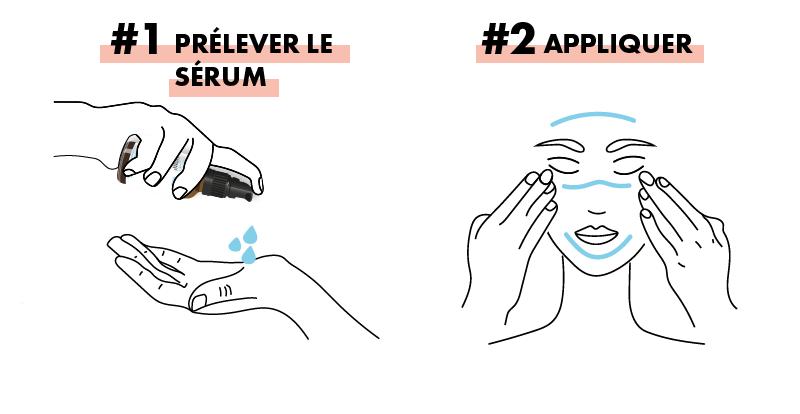We take stock of hyaluronic acid, this darling of beauty useful at all levels
Hyaluronic acid is a molecule that knows how to pamper the skin as it should. But do you really know all the benefits it has?
Updated article, originally published on March 22, 2015.
Hyaluronic acid here, hyaluronic acid there… We hear about this cosmetic molecule everywhere. Integrated into scalp care, skin serums or moisturizers, it is even used in cosmetic surgery to give volume to certain parts of the body such as the lips!
A question is starting to nag us all the same: what is hyaluronic acid? How does it work and above all, what are the contraindications associated with its use?
Let's talk about hyaluronic acid
What is hyaluronic acid?
Hyaluronic acid is a naturally occurring element in the human body . Just like elastin or collagen, it is thanks to him that skin is plump and luscious.
“It acts as a cushioning and lubricating agent for our joints, nerves, hair, skin, and eyes,” Dr. Dendy Engelman tells Byrdie.
Discovered in 1934 in the vitreous humor of the bull's eye, it has the ability to retain up to 1000 times its weight in water. This makes it particularly effective in combating skin dehydration problems. Its main quality? Maintain hydration in the heart of the skin tissues.
However, from the age of 20, the production of hyaluronic acid drops by 6% each year. It is therefore important to counter this phenomenon by integrating topical treatments or food supplements into your routine that can fill this gap.

Because well hydrated skin = skin that stays plump longer!
What is hyaluronic acid used for?
Its first use, which has been found for some time in cosmetic products, is to fight the signs of aging.
Lack of hydration is, in fact, one of the main causes of skin aging. By attracting and capturing moisture towards your skin, hyaluronic acid repairs the hydrolipidic barrier which forms a real protection against external aggressions. When it is not dry, the epidermis marks less and fine lines of dehydration cannot settle.
However, since hyaluronic acid is already a natural molecule in the skin, it can also be used as a moisturizing agent.
Another interesting property: hyaluronic acid is neither greasy nor occlusive! It penetrates very quickly into the heart of the skin and offers a good alternative for dehydrated skin.
Do you have acne? This molecule is also made for you! Not to fight your imperfections but to be able to maintain a certain level of hydration without risking the appearance of new pimples.
How to use a cream based on hyaluronic acid for the face?
What are the treatments with hyaluronic acid for the face?
Hyaluronic acid is now present in many cosmetic products. You can now find it in the form of a lotion, serum, mask, cream or even a naked active ingredient to add to your routine for maximum effectiveness!
Serums with hyaluronic acid
The simplest use remains, in our opinion, the serum: applied under the day cream by light tapping, it then brings a good dose of hydration . A word of advice: always keep your skin slightly damp when you apply your serum, so as to lock in the hydration.
In addition, it is quite possible to use a serum with hyaluronic acid and then a day cream against pimples.
Warning: hyaluronic acid, IT STICKS. No wonder, then, that this sensation remains for a few minutes after application! This does not mean that you can never wear makeup on top of it or that the skin does not want to absorb the product, but it is quite simply the natural texture of this particularly viscous product.
Contraindications of hyaluronic acid
Knowing that it is naturally present in the body, hyaluronic acid does not present any particular contraindications. And for good reason: it is very well tolerated. Especially when used topically as a serum or cream.
On the other hand, injections can be a little less well tolerated in some patients, as cosmetologist Ginger King explains in Byrdie:
The latter nevertheless specifies that the swelling comes mainly from the injection itself, and not from the injected product. Good to know if you want to fill in dehydration lines in the mouth, for example, or in the nasolabial fold.
The best face creams with hyaluronic acid
Serums with hyaluronic acid
Hyaluronic acid, The Ordinary, €6.90
Hyaluronic acid moisturizing serum, The Inkey List, €6
Pure hyaluronic acid, Merme, 34€
Moisturizing creams with hyaluronic acid
Moisturizing cream with hyaluronic acid, Aime Skincare, €35
Vitaminized moisturizing cream with hyaluronic acid, Krème, 24€
Image credits of one: Unsplash – @Kadarius Seegars.
To read also: Retinol: what if we were talking about this superhero of cosmetics?
Codeco of December 3, 2021: the new measures target schools, masks, events, but not the horeca
GO
Sunburn: how to make up for the damage? - Miss
GO
How to Get Free N95 Masks from the US Government
GO
Beauty coaching: can I apply oil if I have oily skin?
GO